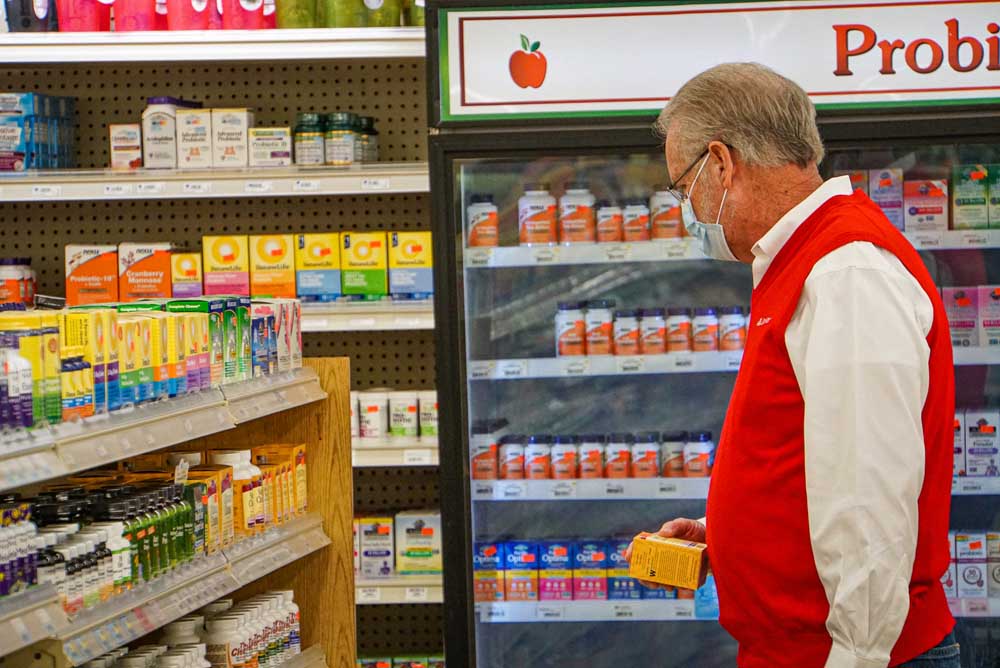COVID-19 and Vitamin D levels: Additional layer of protection?
Published 2:32 pm Friday, January 28, 2022

- Customer Michael Munn looks at the vitamins and supplements inside Drug Emporium in Tyler.
Health officials say vaccines and booster shots are essential for protection against COVID-19, but a healthy immune system is important to maintain as well. Some studies have found that having normal or higher vitamin D levels may be beneficial in warding off COVID-19.
In a study published in September 2020 in the JAMA Network, the relationship between vitamin D levels and likelihood of testing positive for COVID-19 were examined from March 3, 2020 to April 10, 2020.
Trending
The study looked at data from 489 patients who had their vitamin D levels measured the year before COVID-19 testing. The study found that relative risk of testing positive for COVID-19 was 1.77 times greater for patients with likely deficient vitamin D status compared with patients with likely sufficient vitamin D status, a difference that was statistically significant.
The findings ultimately contribute to the role of vitamin D status in COVID-19 risk, however, randomized clinical trials are needed to determine whether broad population interventions and interventions among groups at increased risk of vitamin D deficiency and COVID-19 could reduce COVID-19 incidence.
In the patients who were studied, vitamin D status before COVID-19 testing was categorized as likely deficient for 25%, or 124 participants, likely sufficient for 59%, or 287 patients, and uncertain for 16%, or 78 patients.
Overall, 15% of participants, or 71, tested positive for COVID-19. In multivariate analysis, testing positive for COVID-19 was associated with increasing age up to age 50 years; non-white race, and likely deficient vitamin D status, compared with likely sufficient vitamin D status. Predicted COVID-19 rates in the deficient group were 21.6% vs 12.2% in the sufficient group.
In this single-center, retrospective cohort study, likely deficient vitamin D status was associated with increased COVID-19 risk, a finding that suggests that randomized trials may be needed to determine whether vitamin D affects COVID-19 risk.
Vitamin D can be obtained through diet or supplements, or produced by the body in response to exposure of the skin to sunlight. Most individuals have lower levels of vitamin D, and roughly half of the world’s population has levels below 30 ng/ml.
Trending
A vitamin D3 injection is ideal for those who have osteoarthritis, poor calcium absorption, anemia, those who spend little time in the sun, and those who just had weight-loss surgery. The injection essentially provides an immune system boost.
An East Texas IV therapy clinic partner weighed in and talked about the benefits of a vitamin D3 injection, especially as COVID-19 cases and new variants rise.
“Vitamin D is essential for your immune system. Not only is it essential for your immune system, it helps in the production of red blood cells… It’s not a magic shield, it’s just better to have a humming immune system than not,” said Bob Wheeler, partner at Rapid Recovery in Tyler.
Wheeler said statistically, about 80% of people nationwide who experience a severe case of covid are vitamin D deficient. Since learning that information, the clinic aims to ensure nobody is vitamin D deficient.
As a result, the clinic is offering free vitamin D injections until the end of the year.
While vitamin D supplements are relatively safe to take, excessive consumption of vitamin D supplements is associated with hypercalcemia, a condition in which calcium builds up in the bloodstream and causes nausea, vomiting, weakness, and frequent urination. If left unchecked, it can further lead to bone pain and kidney stones.
“I’m not 100% sure getting the vitamin D will keep you from getting covid, but there’s a huge correlation between the number of people in the hospital who have bad cases of covid and who are vitamin D deficiency, so that’s our goal,” said Wheeler.
Wheeler said the vitamin D supplement is safe to get before or after a covid or flu vaccine. Upon arrival, registered nurses perform a physical assessment, allergy profile and medical history intake, and once approved by the physician there, patients can then receive the treatment.
The vitamin regimen consists of two shots, the second one is injected 10 days after the first one. Wheeler warned it does hurt as it is thick and runs like mayonnaise, but patients are given a numbing spray before the injection.
“Covid will never go away. It vectors in animals. Something like polio, we can vaccinate against and eventually get rid of entirely, but something like covid that can be housed in birds and animals, it’s a respiratory virus that no vaccine can ever cure completely. It will continue to come back year after year, just like the flu,” Wheeler said.
He added the positivity of it is the necessity of staying on top of the immune system, washing hands, using hand sanitizer, not eating or drinking after other people, making sure coughs and sneezes are covered, and staying on top of vitamin regimens.
Other health leaders, including Dr. Anthony Fauci, Chief Medical Advisor to the President of United States, said Vitamin D does have an impact on susceptibility to infection and said he would recommend it to others.







